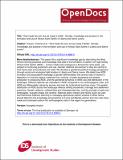| dc.contributor.author | Frausin, Victoria | |
| dc.contributor.author | Fraser, James | |
| dc.contributor.author | Narmah, Woulay | |
| dc.contributor.author | Lahai, Morrison | |
| dc.contributor.author | Winnebah, Thomas | |
| dc.contributor.author | Fairhead, James | |
| dc.contributor.author | Leach, Melissa | |
| dc.coverage.spatial | Liberia | en_GB |
| dc.coverage.spatial | Sierra Leone | en_GB |
| dc.date.accessioned | 2014-09-23T09:35:06Z | |
| dc.date.available | 2014-09-23T09:35:06Z | |
| dc.date.issued | 2014 | |
| dc.identifier.citation | Frausin, Victoria et al. “’God made the soil, but we made it fertile’: Gender, Knowledge and practice in the formation and use of African Dark Earths in Liberia and Sierra Leone”. Human Ecology October 2014, Volume 42, Issue 5, pp 695–710 | en_GB |
| dc.identifier.uri | https://opendocs.ids.ac.uk/opendocs/handle/20.500.12413/4471 | |
| dc.description.abstract | This paper fills a significant knowledge gap by describing the West African farming practices and knowledge that lead to the formation of carbon-rich high-fertility African Dark Earths (AfDE) – human-made soils analogous to Amazonian terra preta - yet subject to continuing production and use. Gender relations and women’s roles are central to how these soils are produced and used. We develop a gendered political ecology perspective through social and ecological field studies in Liberia and Sierra Leone. We detail how AfDE formation and associated knowledge is gender-differentiated; the central roles of women’s deposition of charred organic materials from cooking, oil palm processing and potash production in producing AfDE, and the gendered dynamics of AfDE use and distribution in the landscape. Different species are cultivated in AfDE compared to non-anthropogenic soils, and AfDE are differentially valued by women and men for horticultural and tree crops. The spatial distribution of AfDE across the landscape reflects shifting household, marriage and settlement practices. Gender relations, subjectivities and interdependencies, and the ecology of soils and landscapes, mutually shape one another. National policy makers and NGOs (such as Care and Rainforest Alliance) planning or managing agricultural carbon projects in West Africa should attend to the knowledge and practices of Loma and Mende women and men who have made and cultivated carbon-rich anthropogenic soils in the region for generations. | en_GB |
| dc.description.sponsorship | ESRC | en_GB |
| dc.language.iso | en | en_GB |
| dc.publisher | Springer | en_GB |
| dc.rights | Accepted version. The final publication is available at Springer via http://dx.doi.org/10.1007/s10745-014-9686-0 | en_GB |
| dc.rights.uri | http://www.ids.ac.uk/files/dmfile/IDSOpenDocsStandardTermsOfUse.pdf | en_GB |
| dc.subject | Agriculture | en_GB |
| dc.subject | Environment | en_GB |
| dc.subject | Gender | en_GB |
| dc.title | “God made the soil, but we made it fertile”: Gender, knowledge and practice in the formation and use of African Dark Earths in Liberia and Sierra Leone | en_GB |
| dc.type | Article | en_GB |
| dc.rights.holder | Springer | en_GB |
| dc.identifier.externaluri | http://dx.doi.org/10.1007/s10745-014-9686-0 | en_GB |

